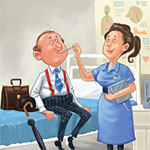RBS starts its return to the private sector
The government began to return Royal Bank of Scotland to the private sector this week, seven years after saving it from collapse.

Get the latest financial news, insights and expert analysis from our award-winning MoneyWeek team, to help you understand what really matters when it comes to your finances.
You are now subscribed
Your newsletter sign-up was successful
Want to add more newsletters?

Twice daily
MoneyWeek
Get the latest financial news, insights and expert analysis from our award-winning MoneyWeek team, to help you understand what really matters when it comes to your finances.

Four times a week
Look After My Bills
Sign up to our free money-saving newsletter, filled with the latest news and expert advice to help you find the best tips and deals for managing your bills. Start saving today!

The government began to return Royal Bank of Scotland to the private sector this week, seven years after taking a 79% stake in order to save it, and the economy, from collapse. Early this week it placed a 5.2% stake on the market at around 330p a share, raising £2.1bn. In 2008, the government paid 502p a share, and ultimately spent a total of £42bn shoring up the bank.
Meanwhile, Tom Hayes, a former trader at UBS and Citigroup, was found guilty of rigging Libor, a global benchmark interest rate (the London Interbank Offered Rate). He is to serve 14 years in prison.
What the commentators said
Perhaps, said James Moore in The Independent, but this sale will mean losses of hundreds of millions of pounds for the taxpayer, given the gulf between the 2008 purchase price and this week's. Why not wait? "Recent results were rather encouraging." Cost cutting is going well and the capital base is getting stronger. If progress continues, and profitability returns, the shares will be highly sought after and the Treasury could even make a profit.
MoneyWeek
Subscribe to MoneyWeek today and get your first six magazine issues absolutely FREE

Sign up to Money Morning
Don't miss the latest investment and personal finances news, market analysis, plus money-saving tips with our free twice-daily newsletter
Don't miss the latest investment and personal finances news, market analysis, plus money-saving tips with our free twice-daily newsletter
"It would be scandalous," agreed Nils Pratley in The Guardian, "if Osborne's desire to get shot of RBS trumps the pursuit of value for money for taxpayers." Enough of this fuss about price, said Lex in the FT. RBS shares may never return to 502p, after all. And it doesn't matter anyway. This wasn't an investment; it was a purchase designed to avoid total economic meltdown. Now that the threat of a collapse has gone, why hold on?
As for Tom Hayes, said The Times, the sentence is "stiff" and "deserved". Rigging Libor "was a staggering fraud". Many transactions including mortgages are based on it, and would have been falsely priced because traders were enriching themselves by rigging the rate. The crime was also so "blatant" that the reckoning for the managers of these traders "must be severe".
Get the latest financial news, insights and expert analysis from our award-winning MoneyWeek team, to help you understand what really matters when it comes to your finances.

-
 How a ‘great view’ from your home can boost its value by 35%
How a ‘great view’ from your home can boost its value by 35%A house that comes with a picturesque backdrop could add tens of thousands of pounds to its asking price – but how does each region compare?
-
 What is a care fees annuity and how much does it cost?
What is a care fees annuity and how much does it cost?How we will be cared for in our later years – and how much we are willing to pay for it – are conversations best had as early as possible. One option to cover the cost is a care fees annuity. We look at the pros and cons.
-
 Banks pass stress test
Banks pass stress testFeatures Britain’s seven biggest lenders have passed the second round of annual stress tests – but how resilient are the tests?
-
 Should you buy RBS shares?
Should you buy RBS shares?Features The government is quietly selling its stake in RBS, the bank it bailed out at a cost of £45bn. Here, Matthew Partridge looks at whether the shares are worth buying.
-
 What's wrong with Britain's banks?
What's wrong with Britain's banks?Cover Story British banks are still in the post-crisis recovery position. Look at what they do, not what they say, to see which ones are progressing, says James Ferguson.
-
 RBS shares slide – but this isn’t a buying opportunity
RBS shares slide – but this isn’t a buying opportunityFeatures After announcing an £8bn loss, RBS's share price has taken a beating. However, as Ed Bowsher explains, that doesn’t mean the bank is worth buying.